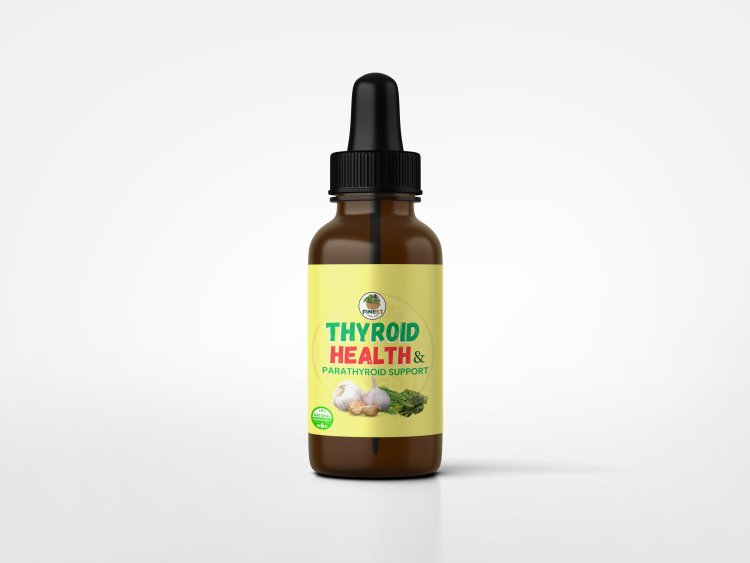Understanding Thyroid Health: The Crucial Role of Diet, Hormones, and Immune Balance
The thyroid gland is a small yet vital part of our endocrine system, significantly influencing various bodily functions, from metabolism and energy production to overall hormonal balance.

The thyroid gland is a small yet vital part of our endocrine system, significantly influencing various bodily functions, from metabolism and energy production to overall hormonal balance. Understanding the factors that affect thyroid health and knowing the signs of potential thyroid imbalances can be essential for maintaining good health.
The Thyroid and Its Crucial Interconnections
Our thyroid does not function in isolation; it has dynamic connections with multiple systems in the body:
Digestive System and Liver: Both play roles in hormone metabolism. The liver, for instance, converts thyroid hormones into their active forms, making its health pivotal in managing thyroid function.
Pituitary and Hypothalamus Glands: These glands produce stimulating hormones that regulate thyroid activity, acting as a control center for thyroid hormone release.
Parathyroid Glands: These tiny glands, located near the thyroid, manage calcium levels in the blood, which impacts muscular and neurological health, and work closely with the thyroid.
An imbalance in any of these systems can lead to thyroid dysfunction, and understanding these interrelations helps us approach thyroid health holistically.
Thyroid Disorders: Hyperthyroidism and Hypothyroidism
Two primary thyroid imbalances can disrupt our well-being:
Hyperthyroidism is characterized by an excess production of thyroxine (T4), leading to symptoms like anxiety, weight loss, rapid heartbeat, and even eye protrusion. Hyperthyroidism often requires treatment to inhibit thyroxine production. Nutritionally, cruciferous vegetables, known for their thyroxine-inhibiting properties, may play a role in managing this condition.
Hypothyroidism, on the other hand, arises from insufficient thyroxine production, often due to iodine deficiency. Those with hypothyroidism might experience fatigue, weight gain, cold sensitivity, and mental fog. Treatment often includes iodine-rich supplements, such as bladderwrack and dulse, which can help stimulate thyroxine production.
While hyperthyroidism often involves a deeper focus on the parathyroid, pituitary, and adrenal glands, hypothyroidism treatment emphasizes liver health to ensure effective hormone processing and detoxification.
Autoimmune Thyroid Conditions: Graves’ Disease and Hashimoto's Thyroiditis
Autoimmune conditions like Graves’ disease and Hashimoto’s thyroiditis involve the immune system mistakenly targeting the thyroid gland:
Graves’ disease leads to an overactive thyroid (hyperthyroidism), while Hashimoto's thyroiditis often results in an underactive thyroid (hypothyroidism). Both conditions require a nuanced approach, focusing on immune modulation to prevent further attacks on the thyroid.
In these cases, amphoteric herbs are often used to help regulate the immune response. These adaptogenic herbs can help balance the immune system, whether it is overactive or underactive, reducing autoimmune attacks on the thyroid.
Managing Thyroid Nodules and Cancer: A Holistic Approach
Thyroid nodules and thyroid cancer present unique challenges, requiring careful regulation of multiple systems:
To address nodules and cancerous growths, treatments often include immune system support and regulation of the digestive system to ensure proper nutrient absorption and toxin elimination.
Additionally, maintaining the balance within the pancreas, thymus gland, spleen, and lymphatic system is essential. Balancing moisture, dampness, and excess heat is crucial, as these factors can impact thyroid tissue health and reduce the risk of further complications.
For cases involving cancerous cells, cytotoxic therapies are sometimes employed. These treatments help target and eliminate cancer cells, aiming to preserve the thyroid's structure and function as much as possible.
Thyroid Health Considerations: Size and Gender Differences
Did you know that thyroid size can vary between men and women? In women, the thyroid often expands during pregnancy to support increased hormonal demands, influenced by the hormone calcitonin, which also helps regulate calcium levels. This hormonal shift underscores the importance of monitoring thyroid health, especially in women, as hormonal fluctuations can affect thyroid size and function.
For those affected by thyroid disorders, understanding the intricate web of relationships between the thyroid and other systems can empower them to make informed health choices. A balanced, holistic approach is often the most effective path to managing thyroid health. Whether through diet, lifestyle, or targeted therapies, nurturing our thyroid can enhance our overall vitality and resilience.
This guide is a small step towards understanding and supporting the health of this essential gland. As awareness of thyroid health grows, individuals can take proactive measures to optimize their well-being, fostering a balanced and harmonious endocrine system.
Get Our Organic Remedy For Throid Health













